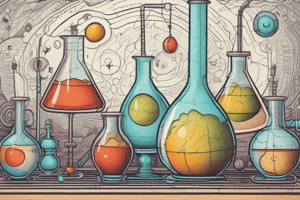Podcast
Questions and Answers
What distinguishes scientific laws from theories?
What distinguishes scientific laws from theories?
- Laws are based solely on experiments, while theories are not.
- Laws describe relationships, while theories propose explanations. (correct)
- Laws propose explanations while theories describe relationships.
- Theories are universally accepted, while laws can vary.
Which aspect is NOT a part of scientific inquiry?
Which aspect is NOT a part of scientific inquiry?
- Testing predictions
- Relying solely on personal beliefs (correct)
- Drawing conclusions
- Asking questions
What is a critical ethical consideration in scientific research?
What is a critical ethical consideration in scientific research?
- Maximizing data collection regardless of methods
- Conducting research without any transparency
- Focusing primarily on funding sources for research
- Avoiding bias and maintaining objectivity (correct)
How are scientific theories viewed in the context of new evidence?
How are scientific theories viewed in the context of new evidence?
Which of the following does NOT promote scientific inquiry?
Which of the following does NOT promote scientific inquiry?
What is the primary purpose of the scientific method?
What is the primary purpose of the scientific method?
Which of the following is NOT a step in the scientific method?
Which of the following is NOT a step in the scientific method?
Which scientific branch studies the interactions of living organisms?
Which scientific branch studies the interactions of living organisms?
What does a scientific theory represent?
What does a scientific theory represent?
What is essential for ensuring the validity of scientific research?
What is essential for ensuring the validity of scientific research?
Why are standardized systems of units, like the SI system, used in science?
Why are standardized systems of units, like the SI system, used in science?
What is the role of error analysis in scientific investigations?
What is the role of error analysis in scientific investigations?
Scientific laws are best defined as:
Scientific laws are best defined as:
Flashcards
Scientific Law
Scientific Law
A description of a relationship between variables, often expressed mathematically.
Scientific Theory
Scientific Theory
A broader explanation for phenomena, supported by evidence from many sources
Scientific Inquiry
Scientific Inquiry
A systematic process for investigation using questions, experiments, and data analysis.
Scientific Ethics
Scientific Ethics
Signup and view all the flashcards
Scientific Misconduct
Scientific Misconduct
Signup and view all the flashcards
Scientific Method
Scientific Method
Signup and view all the flashcards
Scientific Theory
Scientific Theory
Signup and view all the flashcards
Scientific Law
Scientific Law
Signup and view all the flashcards
Branches of Science
Branches of Science
Signup and view all the flashcards
Observation in Science
Observation in Science
Signup and view all the flashcards
Hypothesis
Hypothesis
Signup and view all the flashcards
SI Units
SI Units
Signup and view all the flashcards
Experiment
Experiment
Signup and view all the flashcards
Study Notes
The Scientific Method
- Science is a systematic approach to understanding the natural world based on observation, experimentation, and evidence.
- It involves a cyclical process known as the scientific method.
- The scientific method typically begins with observation of a specific phenomenon.
- Observations lead to questions and potential explanations (hypotheses).
- These hypotheses are then tested through experimentation.
- Data collected from these experiments are analyzed to determine if they support or refute the hypothesis.
- If the hypothesis is supported by data, it may become a theory.
- Scientific theories are well-substantiated explanations that consolidate many observations and tested hypotheses.
- The scientific method is not rigid; different scientific disciplines may emphasize different aspects of the process depending on the subject being studied.
- It’s crucial to be aware of potential biases and to maintain rigorous standards of experimental design.
- Peer review plays a vital part in evaluating the validity and reliability of scientific research.
Branches of Science
- Science is broadly categorized into various branches, each focusing on a specific aspect of the natural world.
- Examples include:
- Physics: Studies matter, energy, motion, and forces.
- Chemistry: Studies the composition, structure, properties, and reactions of matter.
- Biology: Studies living organisms and their interactions.
- Earth Science: Studies the Earth's physical structure, processes, and history.
- Astronomy: Studies celestial objects and the universe.
- These branches often overlap and inform each other, contributing to a more comprehensive understanding of the natural world.
Scientific Measurements and Units
- Accurate and consistent measurement is fundamental in scientific investigations.
- Standard systems of units, like the International System of Units (SI), provide a common language for scientists across the world.
- Units allow for the standardized expression of measurements, enhancing communication and comparison.
- Scientific measurements typically involve instruments that provide quantitative data for analysis and interpretation.
- Different branches of science may use different measuring techniques, but the underlying principles of accuracy and precision remain central.
- Error analysis is crucial for evaluating experimental results.
Scientific Laws and Theories
- Scientific laws describe observed phenomena under specific conditions.
- Laws often express mathematical relationships between variables.
- Examples of scientific laws include the laws of motion and the laws of thermodynamics.
- Scientific theories offer broader explanations for a wider range of phenomena.
- These explanations are supported by considerable evidence from various sources and experiments.
- Theories are constantly refined and revised as new evidence emerges or alternative interpretations arise.
- It's important to distinguish laws, which describe relationships, from theories, which propose explanations.
Scientific Inquiry
- Scientific inquiry involves asking questions, proposing explanations, testing predictions, and drawing conclusions based on evidence.
- It often involves critical thinking, creativity, and problem-solving skills.
- The process of scientific inquiry promotes a systematic approach to investigation, fostering a deeper understanding of the natural world.
- It encourages experimentation, careful observation, and data interpretation through the scientific method.
Scientific Ethics
- Ethical considerations are essential in scientific research, impacting the conduct and validity of scientific investigations.
- Honesty and integrity in data collection, analysis, and reporting are critical.
- Avoiding bias and maintaining objectivity are important for scientific credibility.
- Safeguarding human and animal subjects in experimental research, and ecological concerns are top priorities.
- Open and transparent communication within the scientific community is essential.
- Scientific misconduct, like fabrication or falsification of data, can undermine the trustworthiness of scientific findings.
Studying That Suits You
Use AI to generate personalized quizzes and flashcards to suit your learning preferences.




